Cultivating a healthier agricultural and societal foundation: Passing on the knowledge and practices of environmental regeneration to future generations InsightsEssays: Civil Society in Japan
Posted on October 08, 2024
Japan NPO Center (JNPOC) has a news & commentary site called NPO CROSS that discusses the role of NPOs/NGOs and civil society as well as social issues in Japan and abroad. We post articles contributed by various stakeholders, including NPOs, foundations, corporations, and volunteer writers.
For this JNPOC’s English site, we select some translated articles from NPO CROSS to introduce to our English-speaking readers.
Cultivating a healthier agricultural and societal foundation: Passing on the knowledge and practices of environmental regeneration to future generations
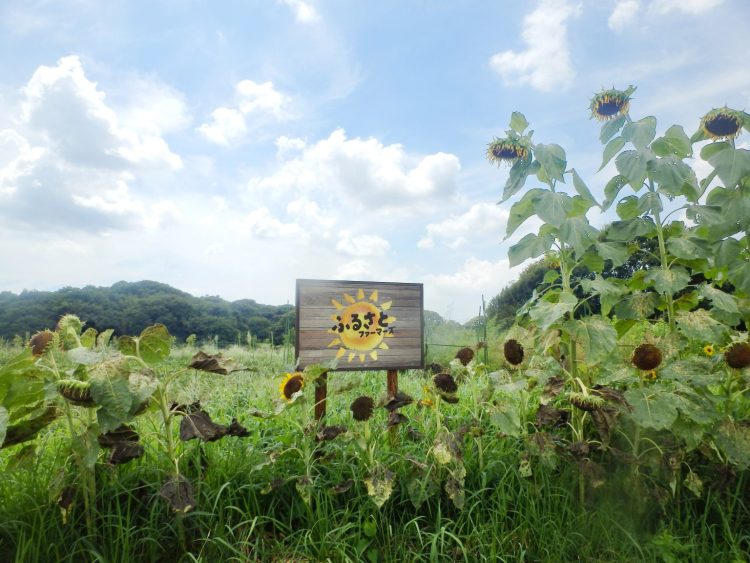
In stark contrast to the bustling beachside of Chigasaki City in Kanagawa Prefecture, I found myself immersed in the serene satoyama landscape. The farmland was alive with the sounds of insects and the wild growth of various plants. It was here that I came across an insect I had never seen before. “This is a Mamehanmyo beetle, a near-threatened species,” explained Masatoshi Ishii, CEO of the NPO Furusato Farmers, who cultivates this land.
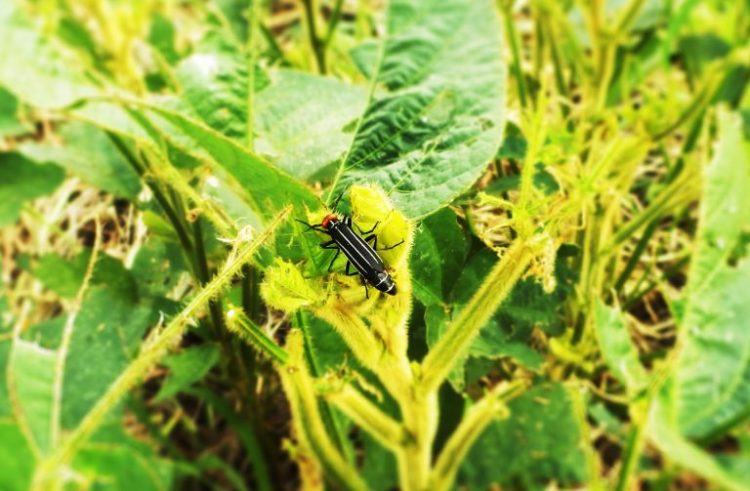
A near-threatened Mamehanmyo beetle welcomed me to the field.
Furusato Farmers, an NPO based in northern Chigasaki, is committed to sustainable agriculture. They grow crops without the use of harmful chemicals, organize volunteer farming programs, and offer hands-on harvest experiences. In addition, they play a crucial role in educating the next generation about agriculture, food, and environmental issues through school outreach programs. They also support Jr. Farmers, a student-led organization focused on addressing food, agriculture, and environmental challenges.
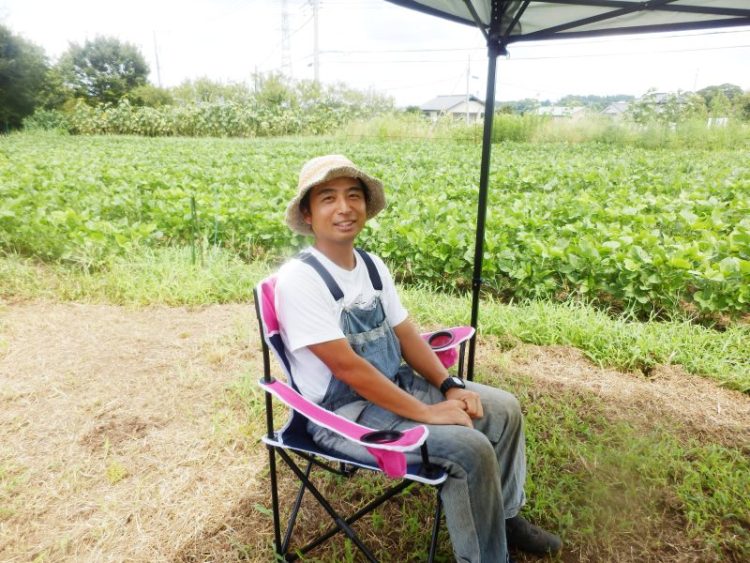
Mr. Ishii, CEO of Furusato Farmers
Considering sustainable agriculture that produces food. The first step is to learn
Before founding this organization, Mr. Ishii was a dedicated corporate employee. However, the 2011 Great East Japan Earthquake sparked a profound shift in his perspective, leading him to question a society that seemed increasingly self-serving. He felt an urgent need to make a meaningful impact. The COVID-19 pandemic further accelerated this shift. When he saw supermarket shelves emptied of wheat products, he became acutely aware of global food vulnerabilities, and Japan’s low food self-sufficiency rate was particularly alarming. With a growing sense of urgency, he realized that the status quo was unsustainable. Motivated by a desire to address these challenges, he founded this organization with a vision of transforming society through agriculture and food.
What started as helping a friend with farming—mainly planting and harvesting—soon grew into a desire to cultivate his own food. After experiencing the challenges and rewards of farming firsthand, Mr. Ishii realized he wanted to use farming as a means to connect with others and make a positive impact on society. He believed that involving more people in the process of growing food was key to achieving this goal.
Through a fortunate opportunity, Mr. Ishii gained access to a 1,500-square-meter plot (about the size of six tennis courts) owned by a local farmer, located next to Kanagawa Prefectural Satoyama Park. Since April 2021, they have been practicing no-till cultivation, a method that is gentle on both the environment and our bodies. No-till farming involves growing crops without tilling the soil, which preserves the soil’s environment and ecosystem by minimizing disturbance and avoiding the use of pesticides and chemical fertilizers. By not tilling, carbon is stored in the soil, reducing carbon dioxide emissions and helping to mitigate climate change.
This approach also helps restore biodiversity, both above and below ground. “This method is called regenerative organic agriculture, and it’s an ideal way to grow crops while revitalizing the Earth’s environment,” says Mr. Ishii. His commitment to sustainability is evident in his dedication to permanent farming.
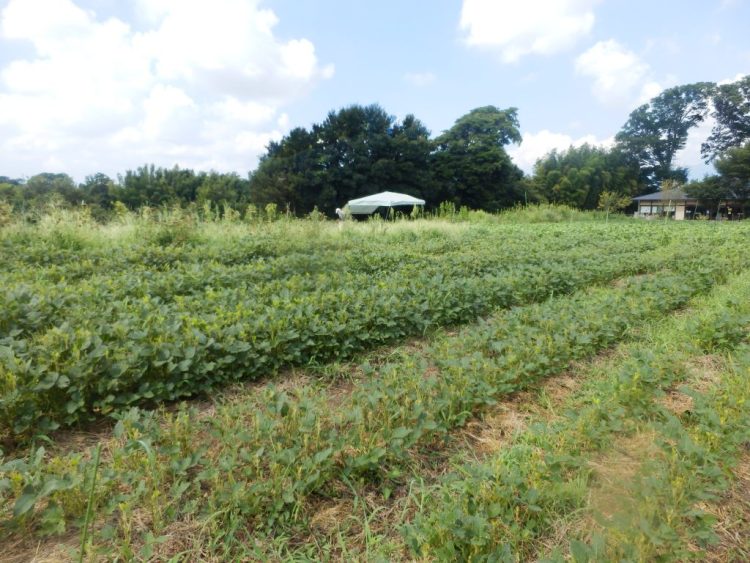
Kurosengoku soybeans, once a popular crop but now rare due to low yields, are increasingly hard to find.
Furusato Farmers are working to preserve these local seeds by sourcing them from seed banks, cultivating and harvesting the soybeans, and then returning the seeds to the seed bank for future generations.
In the course of his work, Mr. Ishii has come face-to-face with the many challenges Japanese farmers face, including harsh working conditions, economic hardship, and the difficulty of finding successors. He has also observed the growing disconnect between producers and consumers. “There are countless reasons why Japanese agriculture is in decline, and the government must step up to improve policies and systems. However, before we can make our voices heard, I believe we need to raise public awareness about agriculture, food, and environmental issues. The first step is education. I want to share this knowledge and, through communications, encourage more people to understand the current state of agriculture and its challenges, make it their own concern, and take action,” says Mr. Ishii passionately.
Seeking communications over correctness
After moving to Chigasaki, Mr. Ishii decided to deepen his involvement in farming and the local community, placing a strong emphasis on building personal relationships with local farmers. “Farming isn’t just about growing crops. It’s about building relationships. You need to greet people, communicate openly, and be willing to help others. Farmers value your attitude and passion more than your farming techniques,” he explains.
By focusing on finding common ground and engaging in communications, even with differing opinions, he has been able to build trust and create new opportunities.
During his school outreach programs, Mr. Ishii also emphasizes the importance of communications.
“Instead of teaching the children, I’m learning with them,” he says. His classes follow a question-and-answer format, encouraging each student to think critically and form their own opinions on various topics. “The most important thing is to think for yourself. It’s not about being right or wrong, but about understanding that everyone is different and finding common ground through communications. By considering things from multiple perspectives, we can build stronger relationships. I believe this kind of mutual respect can also help revive the ‘thank you’ culture that is gradually disappearing from our society today,” he adds calmly.
Some students who have taken Mr. Ishii’s classes have expressed interest in becoming farmers, and others have even visited his farm in Chigasaki. His passion for farming is clearly inspiring.
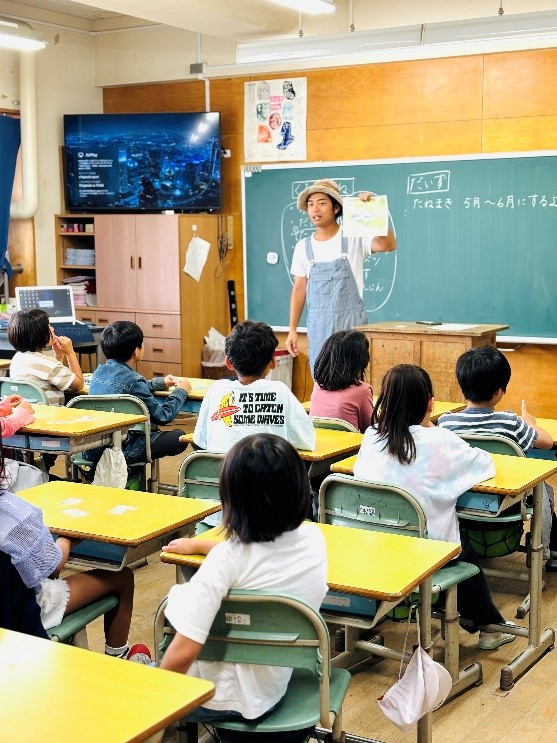
Elementary school students learning about farming. (Photo: provided by Furusato Farmers)
Food and Farming: Cornerstones of Life
Food is essential to human life. “Regardless of one’s occupation, everyone needs to eat. Our goal is to redefine both the positive and negative aspects of food and agriculture, which are fundamental to our existence, and to contribute to a better society through various agricultural initiatives,” Mr. Ishii explains.
He often finds himself learning from the growth of crops. “Plants work hard for themselves until they bloom, and then they devote all their energy to protecting their fruits,” he reflects. “In the same way, I believe humans should also dedicate themselves to the next generation once they reach a certain age. I hope children will come to appreciate the universal value of this kind of selfless devotion, which is present in all living things.”
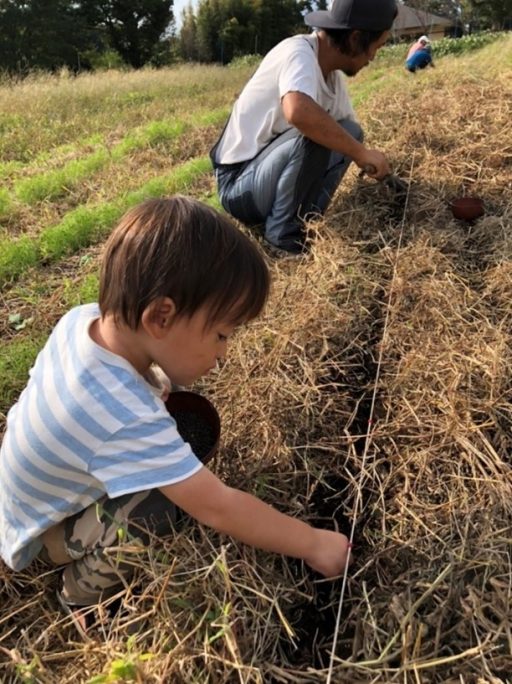
A family helping out on a farm. (Photo provided by Furusato Farmers)
“Our goal is to create a sustainable future for our children and future generations. It’s a long journey, but we’re committed to building a better foundation together. Every day, we face the challenge of finding the motivation to act, where we once found excuses,” says Mr. Ishii, with a determined yet compassionate look in his eyes.
Through his involvement in agriculture, Mr.Ishii has cultivated enduring relationships in the neighborhood and local community. He also works hard to communicate with the younger generation and local businesses to cultivate a healthier and sustainable society. I was very impressed by the dedication to engage in well-being through self-realization. To achieve social well-being that all individuals can engage in their own self-realization and feel happier, Furusato farmers continue to build healthier soil for sustainable agriculture and even for better societal foundation. I deeply believe that their positive and hopeful commitment keeps on spreading awareness to more others.
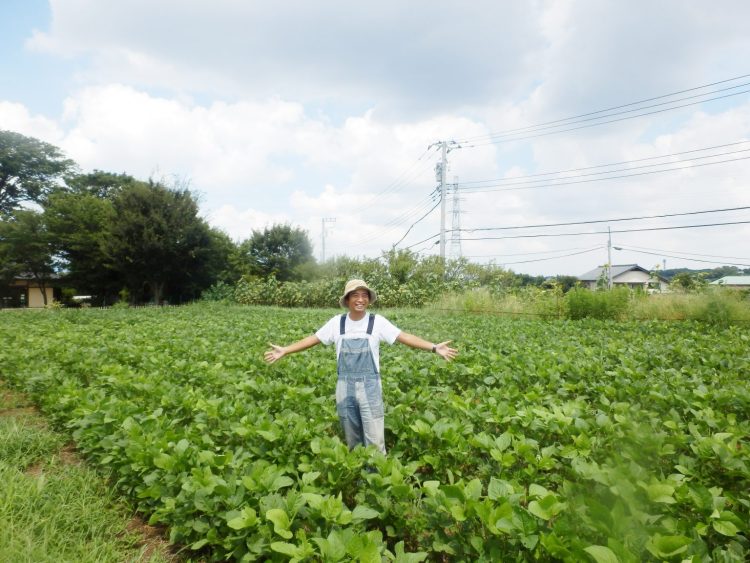
———————-
Original text by Emi Yokoyama (JNPOC volunteer writer) originally posted on September 24, 2024; translated by JNPOC..
Recent Articles
- Towards a society where children want to embrace life
- The Evolution of Philanthropy: Five approaches shaping contemporary practice
- 25 years of community understanding and moms’ hard work: The activities of Kinutama Play Village
- Connecting memories: Courage found at the film screening of parents’ legal battle after the Great East Japan Earthquake Tsunami
- An NPO project I came across while reflecting on teacher shortages after leaving my teaching job
- To unlock philanthropy’s potential for Japan, we need to understand its meaning